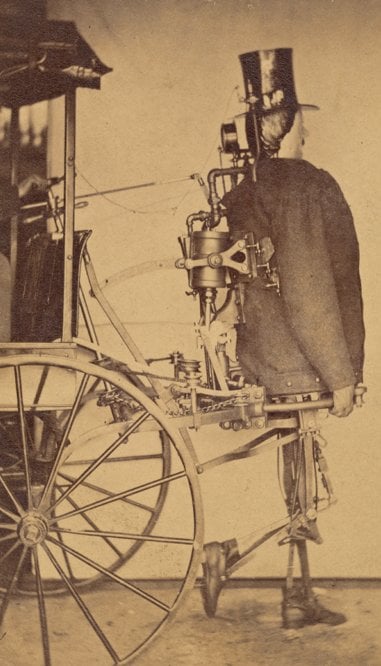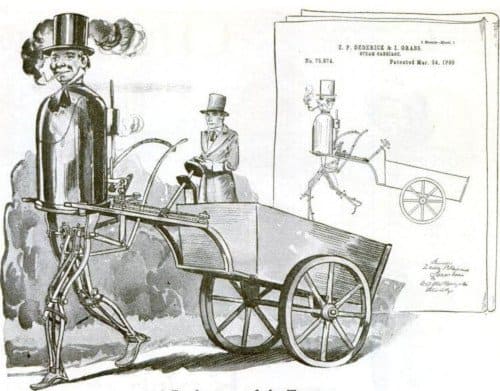6 Facts about the Steam Man
- The Steam Man of Zadoc Dederick is considered the first American robot.
- The machine was so inspirational it generated many more walking machines, steam or otherwise, and also fictional stories, like the famous dime novel The Steam Man of the Prairies by Edward S. Ellis.
- Zadoc Dederick and Isaac Grass, the inventors, were also working on steam-powered horses for use on roads and in fields. There aren’t any records of these steam-powered horses being created.
- The Steam Man could run a mile in two minutes, according to Dederick.
- The end of this steam-powered robot is unknown. It was never sold commercially, partially due to costs and insurance concerns. It was believed to be dismantled or lost in a fire at a museum in New York.

Steam Man History
Zadoc Dederick, born August 8, 1849, worked for the patent attorney and was a machinist in Newark, NJ. He worked with Isaac Grass to develop a unique steam carriage that would use a man-like figure to pull the carriage. He initially attempted to power the Steam Man with a perpetual motion machine but later settled on steam power as a more practical, and possible, power source.
It cost approximately $2,000 to design and create the first Steam Man. While not technically a robot, the human-like design and concept helped pave the way for future robotics. The Steam Man, also known as the Steam Man of Newark, was patented on March 24, 1868.
Quick Facts
- Created
- 1868
- Creator (person)
- Zadoc Dederick, Isaac Grass
- Original Use
- Transportation
- Cost
- Approximately $2,000 in 1868 dollars
The Steam Man was first introduced to the public on Broadway Street in New York. It continued to be exhibited in 1869 in Boston, Chicago, St. Louis, New Orleans, and Fort Wayne, Indiana. The exhibitions were held back by insurance companies who continued to insist on safety precautions such as using slings to hold up the Steam Man and not allowing it to operate at full speeds.

Dederick proposed to sell the Steam Man commercially for $300. However, this price was too expensive for 1868, and there’s no record of any being sold. It may have encouraged other inventors to create their own steam-powered carriages, but Newark wasn’t overrun by steam-powered robots in the 1860s.
There aren’t any records at all of the fate of the Steam Man. He is reported to have died on February 22, 1923. His Steam Man was never a commercial success and there aren’t any remaining reports on what happened to his plans or if he created any future inventions.
Steam Man: How It Worked
Dederick and Grass created a two-wheeled cart that was attached to the steam-powered machine by two iron bars. This held the passengers. So far it had the same basic design as a horseless carriage, but the cart was pulled along by a mechanical robot-like figure, rather than a second set of wheels.
The Steam Man was approximately 7 feet and 9 inches tall. The face and arms were only used to create the appearance of a person. The body, which had a waist measurement of 200 inches, hid the furnace and boiler under a large coat. The entire contraption weighed 500 pounds and took 20 pounds of steam to move.
The legs were the only components of the man not covered. The mechanical legs were powered by steam and designed to pull the cart similar to a person.
Just like other steam-powered devices, the Steam Man had gauges, a stovepipe, and a whistle. All of these essential items were cleverly hidden to keep up the man-like appearance. The gauges were hidden behind the head. The steam whistle was in its mouth. The stovepipe, perhaps most creatively, was its stovepipe hat.
Dederick claimed the Steam Man could successfully walk over irregular surfaces that were up to 9 inches above or below the road grade. Some contemporary reporters, however, mentioned the Steam Man struggled to walk on cobblestone roads.
He also claimed the Steam Man could run an entire year without any maintenance and that it would cost 20 cents of coal for a day of use. These claims don’t appear to be tested due to the steep cost of the invention.
Steam Man: Historical Significance
This iconic steam-powered robot and cart are considered the first American robot. It inspired a generation of inventors to create their own robots and steam-powered carts. It was also the inspiration for the novel The Steam Man of the Prairies by Edward S. Ellis.
In our present day, a contraption such as Steam Man would be old hat. But the excitement he generated at the time was boundless. For an idea of how a person from that time would have viewed it, read this vintage article simply titled The Steam Man which is an excerpt from the New York Express dated March 21, 1868. Notice the language used to describe the debut of this oddity. The writer concludes with the quote, “Whether the steam man prove of any practical good or not, he is unquestionably a great curiosity.”

The image featured at the top of this post is ©History-Computer.com/History Computer Staff.

